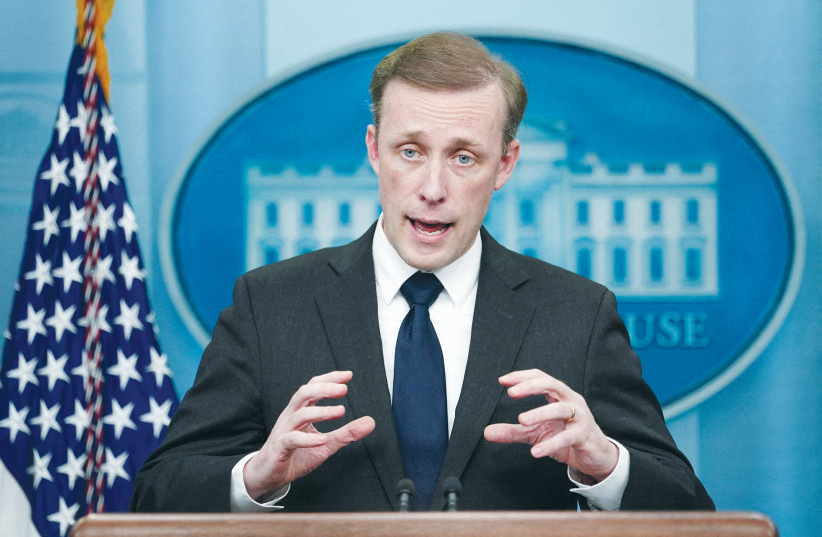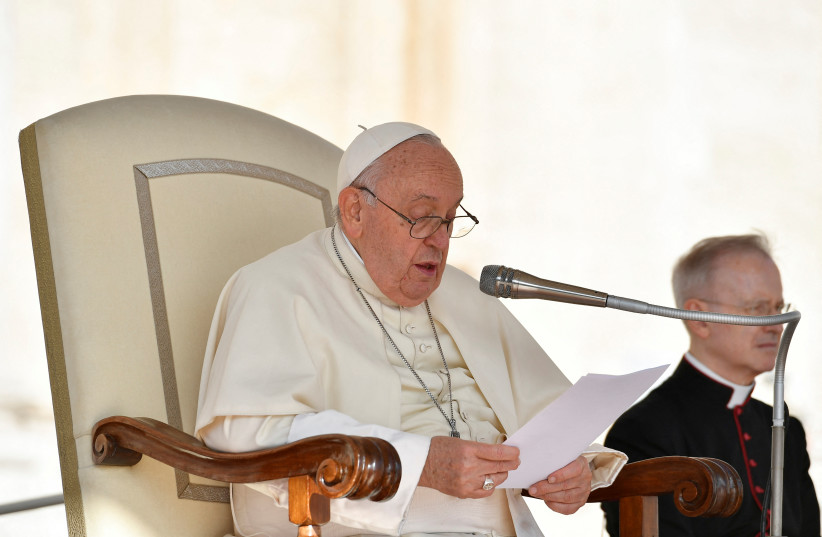The United States and the international community pressed Hamas as well as officials in Jerusalem and Cairo to take urgent steps to protect civilians in Gaza as the IDF continued its aerial strikes there and Palestinians in the Strip were prevented from fleeing into Egypt.
“We stand for the rule of law. We stand for the law of war,” US National Security Advisor Jake Sullivan told CNN on Sunday.
“We stand for the protection of civilians and we want to make sure that innocent Palestinians who have nothing to do with Hamas can get to safe areas... where they will have access to necessities like food, water, shelter and medicine,” he said.
US Secretary of State Antony Blinken announced on Sunday that the Egyptian-controlled border crossing into Gaza would reopen and the US was working with Egypt, Israel, and the United Nations to get assistance through it.
Hundreds of tons of aid from several countries have been waiting in Egypt’s Sinai peninsula for days pending a deal for its safe delivery to Gaza and the evacuation of some foreign passport holders through the Rafah crossing.

Egypt said it had stepped up diplomatic efforts to break the impasse.
“We have put in place, Egypt has put in place a lot of material support for people in Gaza, and Rafah will be reopened,” Blinken told reporters in Cairo after what he said was a “very good conversation” with Egyptian President Abdel Fattah al-Sisi.
“We are putting into place – with the United Nations, with Egypt, with Israel, with others – the mechanism by which to get the assistance in and to get it to the people who need it,” he added.
On Sunday, the United States appointed veteran diplomat David Satterfield as special envoy for Middle East humanitarian issues to lead the US response to the Gaza humanitarian crisis.
Sisi told Blinken, who is on a Mideast tour, that Israel had responded disproportionately by launching its heaviest-ever strikes in retaliation for a devastating incursion by Hamas on October 7, in which 1,300 civilians and soldiers were killed and over 150 people were taken hostage, including Americans.
“The reaction went beyond the right to self-defense, turning into collective punishment for 2.3 million people in Gaza,” Sisi said in a joint appearance.
Blinken: We will stand with Israel.
While Blinken stood firm on the need to protect Palestinians in Gaza, he also backed Israel’s right to strike Hamas.
“We will stand with [Israel] today, tomorrow, and every day, and we’re doing that in word and also in deed… Israel has the right – indeed it has the obligation – to defend itself against these attacks from Hamas, and to try to do what it can to make sure that this never happens again,” Blinken said.
He also met Sunday in Saudi Arabia with Crown Prince Mohammed bin Salman. He visited Israel on Thursday and is expected to return on Monday.
Israel had cut electricity, fuel, food, and water to Gaza in the aftermath of Hamas’s assault on southern Israel.
International organizations have warned of a humanitarian disaster as Israel urged some one million Palestinians in northern Gaza to flee to the southern part of the Strip to escape its planned aerial bombardment against Hamas.
The World Health Organization has explained that there are 22 hospitals in northern Gaza treating more than 2,000 patients. Given that the hospitals in southern Gaza are already at over-capacity, an evacuation to the south “could be tantamount to a death sentence.”
Close to 2,700 Palestinians in Gaza have been killed by the IDF-Hamas violent exchange of fire over the last nine days. Late Sunday, Israel turned the water back on in southern Gaza in hopes of providing an incentive for Palestinians to head there from the north. It’s a move, however, that could be largely symbolic without the electricity and fuel needed for the water system to operate.

Pope Francis calls for humanitarian corridors
In the Vatican on Sunday, Pope Francis called for humanitarian corridors for Palestinians in Gaza.
“I forcefully ask that children, the sick, the elderly and women, and all civilians do not become the victims of the conflict,” he said at his weekly address to thousands of people in St. Peter’s Square.
“May humanitarian rights be respected, above all in Gaza, where it is urgent and necessary to guarantee humanitarian corridors to help the entire population,” he said.
European Union foreign policy chief Josep Borrell spoke out against the deteriorating situation in Gaza. Jordan’s King Abdullah headed to Europe and Great Britain to urge its leaders to press Israel to stop its military campaign in Gaza.
On Saturday night, US President Joe Biden discussed with Prime Minister Benjamin Netanyahu his efforts “to ensure innocent civilians have access to water, food, and medical care” and “affirmed his support for all efforts to protect civilians,” the White House said in describing the fifth call between the two men since October 7.
Biden told reporters in the United States, “We can’t lose sight of the fact that the overwhelming majority of Palestinians had nothing to do with Hamas or Hamas’s appalling attacks.”
At a Human Rights Campaign National Dinner in Washington, Biden said these “innocent Palestinians are being used as human shields.”
In his phone call with PA head Mahmoud Abbas, the first since October 7, Biden “condemned Hamas’s brutal attack on Israel and reiterated that Hamas does not stand for the Palestinian people’s right to dignity and self-determination,” the White House said.
Biden, US officials keep focus on hostages
Biden and US officials also continued to work for the release of the hostages. Netanyahu met with representatives of the families of kidnapped and missing Israelis for the first time on Sunday evening.
During the meeting, the representatives underscored their demand that the government work to free the hostages taken by Hamas immediately and by any means possible.
They told the prime minister that they were aware of the complexity of the issue as well as the opportunities presented to Israel in past days to negotiate the release of the hostages.
Netanyahu, in turn, told the representatives that he was committed to making the hostages’ return one of the primary objectives in the war.
Reuters and Ariella Marsden contributed to this report.•
